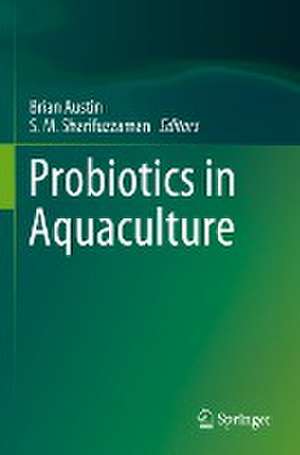Probiotics in Aquaculture
Editat de Brian Austin, S.M. Sharifuzzamanen Limba Engleză Paperback – 5 iul 2023
| Toate formatele și edițiile | Preț | Express |
|---|---|---|
| Paperback (1) | 1109.29 lei 43-57 zile | |
| Springer International Publishing – 5 iul 2023 | 1109.29 lei 43-57 zile | |
| Hardback (1) | 1115.46 lei 43-57 zile | |
| Springer International Publishing – 5 iul 2022 | 1115.46 lei 43-57 zile |
Preț: 1109.29 lei
Preț vechi: 1352.80 lei
-18% Nou
Puncte Express: 1664
Preț estimativ în valută:
212.26€ • 222.21$ • 175.63£
212.26€ • 222.21$ • 175.63£
Carte tipărită la comandă
Livrare economică 07-21 aprilie
Preluare comenzi: 021 569.72.76
Specificații
ISBN-13: 9783030986230
ISBN-10: 3030986233
Ilustrații: XVIII, 308 p. 29 illus., 13 illus. in color.
Dimensiuni: 155 x 235 mm
Greutate: 0.46 kg
Ediția:1st ed. 2022
Editura: Springer International Publishing
Colecția Springer
Locul publicării:Cham, Switzerland
ISBN-10: 3030986233
Ilustrații: XVIII, 308 p. 29 illus., 13 illus. in color.
Dimensiuni: 155 x 235 mm
Greutate: 0.46 kg
Ediția:1st ed. 2022
Editura: Springer International Publishing
Colecția Springer
Locul publicării:Cham, Switzerland
Cuprins
Introduction.- Source and Screening of Probiotic Microorganisms.- Application Methods of Probiotics and Options.- Use of Probiotics in Finfish.- Use of Probiotics in Shellfish.- Paraprobiotics in Aquaculture.- Probiotics for Controlling Infectious Diseases.- Probiotics for Biofloc System and Water Quality.- Probiotics as Vaccine Adjuvants.- Modes of Action of Probiotics.- Factors Influencing the Efficacy of Probiotics.- Quality, Safety and Regulatory Issues of Probiotics.- Methods Used for Selecting and Evaluating Probiotics.- Conclusions.
Recenzii
“This book is very useful for students conducting research in the field of aquaculture diseases, can be used as a teaching material for lectures and could become a guide for researchers in the field of fisheries. … The book's strength is served by many useful illustrations and providing in-depth explanations so that readers can understand more easily the material presented. The book's uniqueness is seen in the information presented … .” (Brian Austin and S.M. Sharifuzzaman, Fish and Fisheries, Vol. 24 (4), July, 2023)
Notă biografică
Professor Brian Austin BSc, PhD, DSc, FHEA is Professor Emeritus of Microbiology at the University of Stirling. His research interests have centred on the taxonomy and ecology of aquatic bacteria, bacterial fish pathology, and marine biotechnology. He has researched novel fish disease control strategies including vaccines, probiotics and medical plant products. He has published over 300 scientific articles and 20 books.
Professor S.M. Sharifuzzaman BSc, MRes, PhD is Professor at the University of Chittagong. His research is primarily focused on sustainable development of aquaculture through disease control, better nutrition/ functional feeds and integrated farming systems. He has developed novel probiotics for controlling pathogenic Vibrio infections in cultured fish. His interests also included biology, ecology and diversity of marine organisms. He has published over 60 scientific articles and several book chapters.
Professor S.M. Sharifuzzaman BSc, MRes, PhD is Professor at the University of Chittagong. His research is primarily focused on sustainable development of aquaculture through disease control, better nutrition/ functional feeds and integrated farming systems. He has developed novel probiotics for controlling pathogenic Vibrio infections in cultured fish. His interests also included biology, ecology and diversity of marine organisms. He has published over 60 scientific articles and several book chapters.
Textul de pe ultima copertă
This book has been developed to provide a detailed discussion of probiotics, which have been evaluated for use predominantly in fish and shellfish aquaculture. This book highlights strengths and weaknesses in knowledge and discusses gaps that need to be addressed. There has been a great deal of research concerning the use of probiotics in aquaculture. To date, a wide range of Gram-positive and Gram-negative bacteria and some eukaryotes, i.e. yeasts and unicellular algae, has been reported to be beneficial to aquatic hosts. Following oral uptake, benefit includes improved growth performance and protection against many bacteria and some parasitic diseases. This book will be suitable for scientists, veterinarians, professionals, and senior students involved in aquaculture.
Caracteristici
Introduces alternative methods of disease control for aquaculture Considers practical and theoretical aspects Highlights the importance of immunomodulation and addresses knowledge gaps
